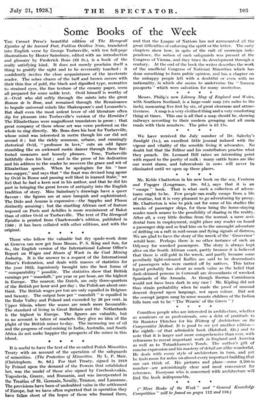Some Books of the Week
THE Cresset Press's beautiful edition of The Heroycall Epistles of the learned Poet, Publius Ovidius Naso, translated into English verse by George Turberville, with ten full-page illustrations by Hester Sainsbury, edited with an introduction and glossary by Frederick Boas. (23 3s.), is a book of the really satisfying kind. It does not merely proclaim itself a thing to gratify the sight and to be reverently touched : it confidently invites the close acquaintance of the inveterate reader. The sober charm of the buff and brown covers with their thin line of gold, the black and dignified type, recreative to strained eyes, the fine texture of the creamy paper, seem all prepared for some noble text. Ovid himself is worthy of it—Ovid who slid softly through the saints into the great Roman de la Rose, and remained through the Renaissance to beguile universal minds like Shakespeare's and Leonardo's. But shall even the most ardent lover of old literature often dip for pleasure into Turberville's version of the Heroides The Elizabethans were magnificent translators in prose : that great company of them whose art was verse preferred on the whole to sing directly. Mr. Boas does his best for Turberville, whose mind was interested in metre though his ear did not second it ; but the richly sensuous, urbane, and cunningly rhetorical Ovid, " professor in love," cuts an odd figure stumbling like an awkward rustic dancer through these flat- footed measures and homely phrases. True, Turberville faithfully does his best ; and in the prose of his dedication and his address to the reader he recovers the grace and wit of Elizabethan speech. When he apologizes for his " base rere-supper," and says that " the feast was devised long agone by Ovid in Rome and passing well liked in learned Italie," we feel that he had a keen zest in his author, and that he did his part in bringing the great lovers of antiquity into the English tradition of story. Miss Sainsbury's drawings have a queer flavour : the figures are at once lumpish and sophisticated. The Dido and Aeneas is expressive—the Sappho and Phaon distinctly amusing ; but the startling African cast of feature imposed on Paris and Achilles is more reminiscent of Bakst than of either Ovid or Turberville. The text of The Heroycall Epistles is printed from Charlewoode's edition, published in 1580 ; it has been collated with other editions, and with the
original. * * * *




















































 Previous page
Previous page